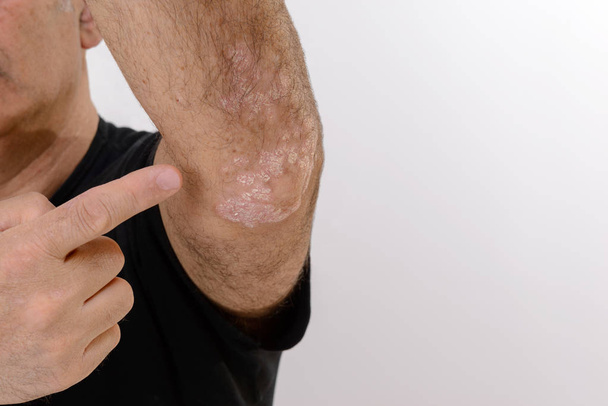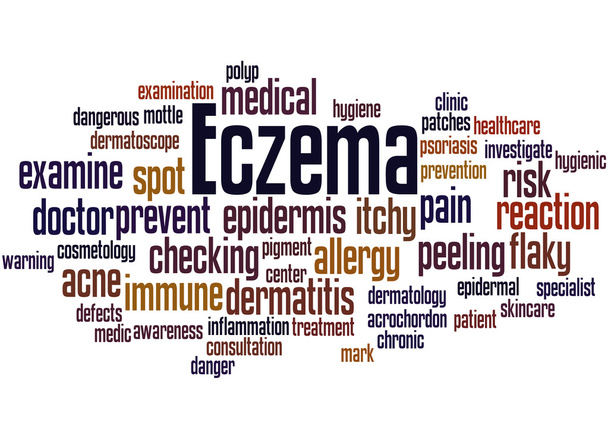Medically Reviewed by:
Name: Ezire Lilian Chinwe
Description: A highly motivated and licensed biomedical scientist with over 7 years of experience, dedicated to advancing healthcare through innovative research and analysis. Expertise includes genetics, microbiology, and immunology with a commitment to staying at the forefront of scientific advancements.
Understanding Psoriasis and Chronic Inflammation
This guide explores the complicated link between psoriasis and chronic inflammation. Psoriasis is a long-term skin disease. It affects millions of people across the globe. This condition can be uncomfortable and can reduce a person’s quality of life. We look at the relationship between psoriasis and chronic inflammation to offer important information on this health problem.
What Is Psoriasis?
Psoriasis is a common autoimmune skin condition. It causes skin cells to build up quickly on the skin’s surface. This leads to red, itchy, and scaly patches, called plaques. Plaques can form anywhere on the body. They are most often seen on elbows, knees, scalp, and lower back. Psoriasis usually flares up repeatedly. These flare-ups can cause both physical and emotional distress.

The Role of Chronic Inflammation
Chronic inflammation is a crucial factor in understanding the pathology of psoriasis. It is not only a symptom of the condition but also a contributing factor to its development and exacerbation. When the immune system becomes overactive, it triggers an inflammatory response that accelerates the skin cell turnover rate, leading to the characteristic plaques seen in psoriasis.
Psoriasis Triggers and Risk Factors
Psoriasis is a multifactorial condition influenced by various triggers and risk factors. While the exact cause remains elusive, several key factors contribute to the development of psoriasis:
Genetics
Genetics plays a significant role in determining an individual’s susceptibility to psoriasis. Research has identified specific genes associated with the condition, and individuals with a family history of psoriasis are at a higher risk of developing it themselves.
Immune System Dysfunction
An overactive immune system is a common denominator in psoriasis cases. T cells, a type of white blood cell, become hyperactive and initiate an inflammatory response that accelerates skin cell turnover, resulting in psoriatic plaques.
Environmental Triggers
Environmental factors, such as stress, infections, and certain medications, can trigger or exacerbate psoriasis. Managing these triggers is crucial in minimizing flare-ups.
The Link Between Chronic Inflammation and Psoriasis
Understanding the connection between chronic inflammation and psoriasis is essential for effective management and treatment. Chronic inflammation in psoriasis occurs primarily due to an imbalance in immune system activity. This dysregulation leads to the release of pro-inflammatory cytokines, which further exacerbate the condition.
Pro-Inflammatory Cytokines
Pro-inflammatory cytokines such as TNF-alpha and IL-17 play a major role in causing inflammation linked to psoriasis. They lead to an increase in skin cell growth and inflammation. This results in the formation of psoriatic plaques.
Immune System Modulation
To treat long-term inflammation caused by psoriasis, many treatments aim to adjust how the immune system works. Medicines known as biologics are particularly effective. They act on certain proteins called cytokines. This action greatly lowers inflammation and helps clear up the skin of those with psoriasis.
Psoriasis Management Strategies
Effectively managing psoriasis involves a multifaceted approach that addresses both the symptoms and the underlying chronic inflammation. Here are some key strategies for psoriasis management:
Topical Treatments
Topical treatments, such as corticosteroids and calcineurin inhibitors, are applied directly to the affected skin to reduce inflammation and alleviate symptoms.
Phototherapy
Phototherapy, or light therapy, exposes the skin to controlled amounts of ultraviolet (UV) light, which can help slow down skin cell turnover and reduce inflammation.
Systemic Medications
For more severe cases of psoriasis, systemic medications, including biologics and immunosuppressants, can be prescribed to modulate the immune system and reduce inflammation.
Lifestyle Modifications
Lifestyle changes, such as stress reduction, a balanced diet, and regular exercise, can have a positive impact on psoriasis management by minimizing inflammation triggers.
Conclusion
In conclusion, Psoriasis is closely related to chronic inflammation. Inflammation is important in both the start and worsening of this skin disorder. It’s crucial for both patients with psoriasis and their healthcare providers to understand this link. This knowledge helps providers offer better treatments. When patients and doctors focus on reducing chronic inflammation, they can manage psoriasis more effectively. This holistic strategy can lead to improved control of the condition and a better quality of life for those affected.
Frequently Asked Questions (FAQs) Understanding Psoriasis and Chronic Inflammation
Q1: What is the main cause of psoriasis?
A1: The exact cause of psoriasis remains unclear, but it is believed to result from a combination of genetic predisposition, immune system dysfunction, and environmental factors.
Q2: Is psoriasis contagious?
A2: No, psoriasis is not contagious. It is an autoimmune condition that develops due to factors related to an individual’s immune system and genetics.
Q3: How is chronic inflammation linked to psoriasis symptoms?
A3: Chronic inflammation in psoriasis is closely tied to an overactive immune response, which triggers the rapid turnover of skin cells and the development of plaques. Inflammation exacerbates skin symptoms.
Q4: Are there different types of psoriasis?
A4: Yes, there are several types of psoriasis, including plaque psoriasis, guttate psoriasis, inverse psoriasis, pustular psoriasis, and erythrodermic psoriasis. Each type presents with distinct symptoms.
Q5: Can psoriasis be cured?
A5: Psoriasis is considered a chronic condition with no known cure. However, it can be effectively managed with various treatments and lifestyle adjustments, leading to symptom relief and improved quality of life.
Q6: What are biologic medications, and how do they treat psoriasis?
A6: Biologic medications are a type of treatment that targets specific molecules in the immune system, such as cytokines, to reduce inflammation in psoriasis. They are often administered by injection or infusion and can be highly effective in managing symptoms.
Q7: Are there natural remedies for managing psoriasis?
A7: Some individuals find relief from psoriasis symptoms through natural remedies like moisturizing, dietary changes, and stress reduction. However, it’s essential to consult with a healthcare professional to develop a personalized treatment plan.
Q8: Can psoriasis lead to other health complications?
A8: Psoriasis is associated with an increased risk of other health issues, including cardiovascular disease, arthritis, and depression. Managing psoriasis effectively can help reduce these risks.
Q9: Is UV light therapy safe for psoriasis treatment?
A9: UV light therapy, when administered under medical supervision, is generally considered safe and effective for psoriasis treatment. However, it may not be suitable for everyone, so consultation with a dermatologist is recommended.
Q10: How can I improve my overall quality of life while living with psoriasis?
A10: Improving your quality of life with psoriasis involves a holistic approach. Focus on stress reduction, maintaining a balanced diet, staying hydrated, and following your healthcare provider’s treatment plan to minimize symptoms and discomfort.
These frequently asked questions provide additional insights into psoriasis and chronic inflammation, addressing common queries that individuals may have when seeking information about this condition.
Sources:
National Psoriasis Foundation www.psoriasis.org/advance/understanding-inflammation/
Medical News Today www.medicalnewstoday.com/articles/psoriasis-and-chronic-inflammation
Medically Reviewed by:
Name: Ezire Lilian Chinwe
Description: A highly motivated and licensed biomedical scientist with over 7 years of experience, dedicated to advancing healthcare through innovative research and analysis. Expertise includes genetics, microbiology, and immunology with a commitment to staying at the forefront of scientific advancements.









